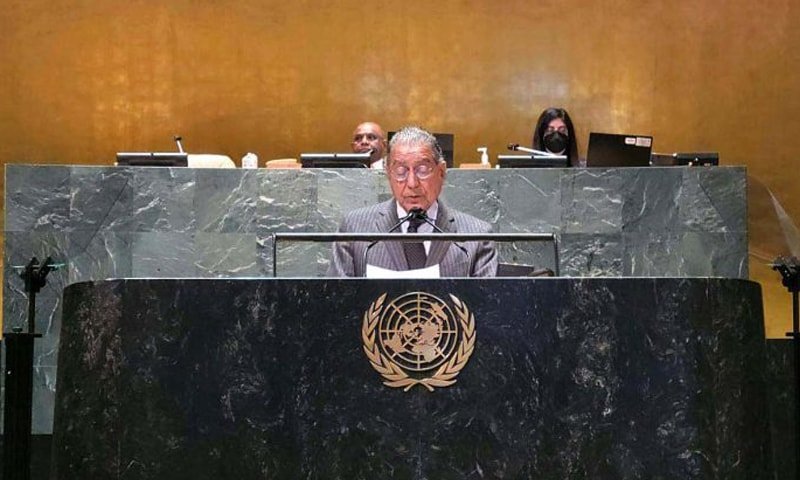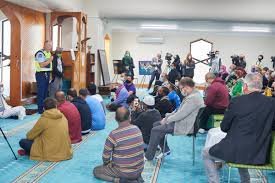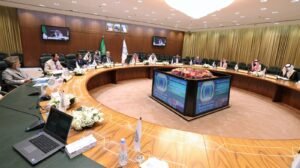UNGA Declares March 15 as International Day to Tackle Islamophobia

The United Nations General Assembly (UNGA) has declared March 15 as international day to tackle Islamophobia.
On Tuesday March 15, 2022, UNGA adopted by consensus a resolution introduced by Pakistan on behalf of the Organisation of Islamic Cooperation (OIC) to combat Islamophobia.
The resolution was sponsored by 57 members of the OIC, and eight other countries, including China and Russia.
Several member states hailed the document, but the representatives of India, France and the European Union expressed reservations, saying that while religious intolerance was prevalent all over the world, the resolution singled out only Islam and excluded others.
Indian Ambassador TS Trimurti complained that the resolution did not cover anti-Hindu phobia, among other religions.
Meanwhile, Prime Minister Imran Khan congratulated the Muslim ummah on the development.
“Our voice against the rising tide of Islamophobia has been heard and the UN has adopted a landmark resolution introduced by Pakistan,” he tweeted.
The premier added, “Today, the UN has finally recognised the grave challenge confronting the world: of Islamophobia, respect for religious symbols and practices and of curtailing systematic hate speech and discrimination against Muslims.”
Under its terms, the resolution strongly deplores all acts of violence against persons on the basis of their religion or belief and such acts directed against their places of worship, as well as all attacks on and in religious places, sites and shrines that are in violation of international law.

At the UNGA session, Ambassador Munir Akram, who is the permanent representative of Pakistan to the UN, said, “Islamophobia is a reality.”
Noting that the phenomenon was growing, he stressed the need to address it.
Akram highlighted that Prime Minister Imran Khan was the first to raise the issue of Islamophobia at the UN in his “historic” 2019 address to the General Assembly, and had repeatedly called for international attention and efforts to address it.
“Today’s resolution invites all member states, relevant organisations of the United Nations system, other international and regional organisations, civil society, private sector and faith-based organisations to observe the international day in an appropriate manner,” he said.
In his introductory remarks, Akram said Islamophobia’s manifestations — hate speech, discrimination, and violence against Muslims — were proliferating in several parts of the world.
“Such acts of discrimination, hostility and violence towards Muslim individuals and communities constitute grave violations of their human rights and violate their freedom of religion and belief. They also cause great anguish within the Muslim world,” the Pakistan envoy said.
The ambassador referred to a report of UN Special Rapporteur on Freedom of Religion or Belief, which he said stated that since 9/11 attacks, “institutional suspicion and fear of Muslims and those perceived to be Muslim has escalated to epidemic proportions”.
In such climates of exclusion, fear and distrust, “Muslims often feel stigma, negative stereotyping and shame and a sense that they are suspect communities that are being forced to bear collective responsibility for the actions of a small minority,” he said.
“The spread of Islamophobia, both in terms of the phenomenon’s momentum and outreach, is particularly alarming these days, for it has emerged as a new form of racism characterized by xenophobia, negative profiling and stereotyping of Muslims,” Akram said.
In this regard, he noted that the “rise in hate crimes against Muslims, both offline and online, as well as discrimination in education, citizenship, immigration, employment, housing and healthcare sectors, among others, are well documented”.
The gender aspect of Islamophobia was also gaining prominence, with girls and women being targeted due to the mode of their dress and the general notion that Muslim women are oppressed and thus must be liberated, he pointed out.
“What indeed is worrisome,” the Pakistani envoy said, was that Islamophobia “continues to find strong resonance in political spheres, ultimately leading to the institutionalization of Islamophobia through new legislation[s] and policies, such as discriminatory travel bans and visa restrictions”.
“Various academic studies have revealed that Islamophobia is most visible in the media and in the discourse of far-right groups and political parties and groups, who tend to exploit and build on the general fear of Islam for electoral gains,” he added.
In some countries, he said, anti-immigration and anti-refugee rhetoric had taken an anti-Muslim overtone and had often become the central theme of political campaigns.
Ambassador Akram voiced grave concern over several media outlets continuing to “propagate fear and negative stereotypes against Islam and Muslims, notably by acting as a platform for widespread dissemination of anti-Muslim rhetoric”.
“Despite its pervasive impacts, Islamophobia remains poorly understood, [and] it is essential to promote greater information of this phenomena and promote solutions through greater understanding and full respect for human rights and fundamental freedoms,” he said.
The ambassador also outline the objectives that he said the draft resolution served to achieve.
The objectives are as follows:.
1. Raise international awareness about the growing phenomenon of Islamophobia and anti-Muslim hatred
2. Send a clear message that the world opposes all forms of racism, racial discrimination, xenophobia, negative stereotyping and stigmatisation
3. To promote the message of tolerance, peaceful co-existence and interfaith and cultural harmony among all religions, races and nations
4. To demonstrate by commemorating on this day unfettered solidarity with all humanity, convey a strong message of respect for human dignity, and reiterate common commitment to unity in diversity
“The objective of observing this day is about uniting, not dividing,” the envoy said, concluding his address.







